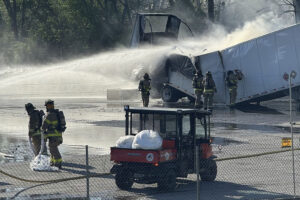Today’s the day. May Day. Or “mayday,” as protest organizers who have adopted the well-known international radio distress signal, have labeled May 1, 2020.
Demonstrations have begun in Washington D.C. and in Chicago. In Washington, dozens of trucks are parked along Constitution Avenue, within view of the White House, blowing their air horns in unity with the cause. Reporters from several local television stations have covered the event, broadcasting coverage of the parked trucks and crescendo of air horns. Interviews with organizers and participants have been observed on sidewalks near the demonstration. Homemade banners proclaiming “Make trucking great again” hang from commercial motor vehicles, and American flags are everywhere.
In Chicago, more trucks gathered at a Northbrook truck stop in preparation for a Chicago protest.
Social-media venues have been flooded with photos, videos and comments supporting the demonstrating drivers.
Protests were also scheduled in Houston, Phoenix and Los Angeles. All three cities saw “slow roll” protests last week, and organizers have promised to return for today’s “mayday” demonstration.
Organizers are hoping to raise awareness of issues faced by small-business truckers, most of whom own their trucks. The most-expressed complaint is low freight rates, usually accompanied by complaints that brokers are paying truckers too little, keeping excessive amounts of the revenue paid to them by shippers.
Other complaints are that drivers don’t have access to masks, gloves and sanitizer despite being categorized as essential workers; that the government hasn’t done enough to ensure adequate available food and parking; and that government regulations, especially the requirement for Electronic Logging Devices (ELDs), are overbearing and counterproductive.
While it’s true that demonstrations can draw the attention of government, press and public, the publicity generated isn’t always positive. In some ways, these protests can harm the public’s perception of the protesters, in this case, truck drivers — and the trucking industry as a whole — at a time when help is needed.
Protests that interfere with traffic, either by blocking lanes or “slow rolling,” can incite public annoyance and anger. There are also safety issues to consider as motorists are impeded by the parade of protesting truckers.
Another issue is effectiveness. It seems that every year brings another protest or work stoppage that results in minimal actual change. Whether the public feels the issues faced by truckers this year are more serious than those in past years remains to be seen.
There’s also the argument that at least some of the protesting truckers are suffering pain that is, at least in part, self-inflicted. Often, small-business truckers treat settlement checks as personal pay rather than business revenue, living from check to check just as employees of businesses sometimes do. Trucking businesses that don’t set aside revenue for maintenance, repairs, taxes and other expenses are vulnerable no matter how large or small. It’s a sad reality that many drivers who work hard and are excellent drivers are not quite as skilled at managing their businesses. Many owner-operators are one major repair, accident or cargo claim away from insolvency.
Vehicle selection can be problematic too. Large carriers replace their trucks regularly, keeping a close eye on maintenance costs and replacing equipment as the costs are expected to rise. Owner-operators, for the most part, purchase used, older equipment that is less expensive to buy but more likely to suffer expensive mechanical problems. While the cost of repairs can hit the budget hard, the owner also loses revenue that could have been earned while the truck was in the shop, exacerbating the problem.
How the trucks are equipped also matters. Owner-operators often want bigger engines, heavier components, larger sleepers and more chrome — features that well-run carriers eschew for economic reasons. The result is that big-name carriers can accept lower freight rates, helping drive down the average for everyone. Owner-operators can experience difficulty in contracting with regular customers because many of those customers prefer to deal with a few large carriers that can handle all of their freight rather than hundreds — or even thousands — of individual truckers.
Most of the larger carriers have customers they contract with for set rates. The owner-operators who depend entirely on the spot market, where rates are much more volatile, can struggle when the rates decline. Those who depend on the spot market often find loads on Internet load boards, resulting in each operator dealing with a variety of brokers without developing a solid business relationship with any of them.
One way truckers can help themselves is with a regulation that’s already in place. The Federal Motor Carrier Safety Regulations part 371.3 governs records that must be kept by freight brokers. For each brokered load, that record must show from whom the load was obtained, the carrier it was brokered to, the services provided by the broker, and the amount of compensation the broker received.
The requirement in 371.3(c) is one that few owner-operators take advantage of. It states, “Each party to a brokered transaction has the right to review the record of the transaction required to be kept by these rules.” Truckers who believe a broker has retained excessive amounts of the load revenue can verify their suspicions by simply asking to see the record, which must be provided upon request. Since that record also includes compensation for nonbrokerage services, such as detention pay or performance penalties, the owner-operator can review those numbers, too.
Since brokers must receive the authority to operate from the FMCSA just as carriers do, truckers have an avenue to submit complaints for brokers who don’t comply.
A common complaint is that some brokers will “blackball” carriers who ask to see this information. That’s a legitimate concern for owner-operators who can’t afford to lose a source of loads. That’s one reason that OOIDA, according to media spokesperson Norita Taylor, supports the requirement for brokers to provide electronic records to the carrier as soon as the haul is complete, negating the obligation of the carrier to ask for them.
“The cost of trucking is a little more transparent than the broker’s cost,” said Jeff Hopper, vice president and chief marketing officer for DAT. Requiring the broker to provide the information required in the regulations would undoubtedly increase the transparency of the broker’s business.
Finally, there’s the power of simply saying, “No.” Brokers and shippers will always attempt to find the carrier who will accept the lowest rate, because it’s in their financial interest to do so. When rates are down and more truckers are looking for a load, negotiating becomes more difficult. And it’s true that some owner-operators will accept loads in order to keep cash, however little of it, flowing into their business. Some may accept a low-payload because the delivery positions them for a better one, a bigger-picture view that can be beneficial. There’s no question, however, that when no one accepts a low rate, that rate will rise. Growers, distributors and manufactures don’t profit by keeping their products.
In any business, difficult economic times call for the best possible management practices. Owner-operators who know exactly what it costs to run their businesses and who remain acutely aware of which loads help them achieve their financial goals are the most likely to survive.
[Photo courtesy of Rebecca Doty via Facebook]
Cliff Abbott is an experienced commercial vehicle driver and owner-operator who still holds a CDL in his home state of Alabama. In nearly 40 years in trucking, he’s been an instructor and trainer and has managed safety and recruiting operations for several carriers. Having never lost his love of the road, Cliff has written a book and hundreds of songs and has been writing for The Trucker for more than a decade.









To Whomever wrote this article:
Have you ever actually drove a Truck before?
Have you ever booked a load before?
Have you ever actually run a Carrier based business?
If not, Why are you explaining to people that are protesting low rates how they should run their company?
Do you know how much insurance costs?
Do you know what state charges host much per mile to driver through their state?
Do you know how much ifta charges?
Do you know how much dispatching services cost?
Do you know how much it costs to actually buy a truck?
Do you know how much it costs to maintain that truck?
Do you know any of these things?
Or are you just writing a article out of your ass?
Yep exactly my thoughts.
Guy who wrote this article is full of it,bunch of nonsense,im a trucker for fifteen years and i never heard much nonsense.
Dear author, It would be my pleasure to host you as my co-driver in my truck and take you on the road for a month so you can see first hand what it is like. You wrote some things that have to be remedied and the best way to do so is to show you first hand what trucking is.
The person that wrote this article doesn’t have the minimum idea of what he is talking about. This article its an insult.
Who wrote this article is piece of sh.t!!!!!!@
I’ve been an owner operator for 6 1/2 years I also own my own truck I started driving since 1982 Started over the road regional runs. Basically since 2004 over the road . 2018 was a good year 2019 sucked and 2020 suck big time then I found out that most of these brokers are taking close to 65% from the run and they expect us to run for garbage and a lot of trucks to run Because they have to pay their bills but they don’t realize they’re not putting money over to the side for maintenance ,breakdowns and emergency besides other things that have to do with the bills so the only thing that they’re doing is hurting Their self and other truckers because when the broker see that the runs are being taken, they will keep on screwing us If everybody would shut the truck down all at once for three days I will bring this nation to Their knees .And you wouldn’t see these rates like this again. But everybody’s got to do it. I noticed the western part of United States get screwed the worst. So you Can Wise up And stand up or keep on getting screwed
Exactly. TQL was offering a load for .80 a mile swearing up and down that he booked that rate the previous day. I’m sure he did. Us truck drivers are our own worst enemy when we take cheap freight. I told him to F off and he hung up on me.
It doesn’t matter how well you manage your business. The bottom line is that it takes a certain amount of cash flow to cover your cost. Semi trucks aren’t free, neither are fuel, tires, insurance, ifta, baseplates, mechanic bills etc etc. If your cash flow doesn’t cover your expense, then you are working for free. Who likes to be gone for weeks on end for absolutely nothing? Not me